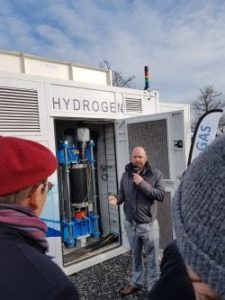Deciphering Fuel Consumption in a Hydrogen Combustion Engine: Efficiency and Sustainability

Introduction
In a world increasingly concerned about the environment and sustainability, the use of hydrogen as an alternative fuel has gained popularity. Hydrogen combustion engines stand out for their potential to reduce carbon emissions and lessen our reliance on fossil fuels. In this article, we’ll explore in detail how much fuel a hydrogen-burning engine uses, its efficiency, and how this technology is paving the way toward a cleaner, more sustainable future.
Understanding the hydrogen combustion engine
Before we get into fuel consumption, it’s important to understand how a hydrogen combustion engine works. Unlike traditional internal combustion engines, which use gasoline or diesel, these engines burn hydrogen to generate mechanical power. During combustion, hydrogen combines with oxygen from the air to produce water and release energy in the form of movement.
Hydrogen Combustion Engine Efficiency
The efficiency of a hydrogen combustion engine is a crucial aspect to take into account. Fortunately, these engines offer high efficiency compared to traditional combustion engines. While a typical gasoline engine has an efficiency of around 20-30%, a hydrogen engine can achieve efficiencies close to 40%. This means that they make better use of the energy contained in the fuel and generate less waste.
Hydrogen consumption in a combustion engine
The consumption of hydrogen in a combustion engine depends on several factors, such as engine load, speed, design and system efficiency. On average, a hydrogen combustion engine can consume approximately 0.2 to 0.4 kilograms of hydrogen for every kilowatt-hour (kWh) of energy produced. It is important to note that this figure may vary depending on the type of engine and operating conditions.
Advantages of hydrogen as a fuel
Hydrogen offers a number of advantages as a fuel in combustion engines. First, its combustion does not produce carbon emissions, which helps reduce the impact of climate change. Furthermore, hydrogen is widely available and can be obtained from renewable sources, making it a sustainable option in the long term. It is also important to mention that hydrogen is highly volatile and disperses quickly in the event of a leak, which improves safety compared to other fuels.
Challenges of the use of hydrogen in combustion engines
Despite its advantages, the use of hydrogen in combustion engines also presents challenges. One of the main problems is the storage and distribution of hydrogen, since it requires specific infrastructures to guarantee its safe handling. Also, hydrogen has a low energy density, which means that a larger volume is needed to store the same amount of energy as in fossil fuels.
Research and development in hydrogen engine technology
Hydrogen combustion engine technology is constantly evolving. Researchers are working to improve engine efficiency, reduce costs, and develop new hydrogen storage systems. In addition, hybrid approaches that combine hydrogen engines with fuel cell technologies are being explored for even more efficient performance.
Examples of hydrogen engine applications
Although hydrogen engine technology is not yet as widespread as traditional combustion engines, significant advances are already being made in different areas. For example, some public transportation vehicles and commercial vehicle fleets already use hydrogen engines as a clean alternative to fossil fuels.
Conclusion
Hydrogen combustion engines represent a promising path to reduce carbon footprints and move towards a more sustainable future. With high efficiency and zero carbon emissions, hydrogen is emerging as a viable solution to address the energy and environmental challenges we face. As research and development continues, we are likely to see an increase in the adoption of this technology in various sectors. With the right push, hydrogen could become the fuel of tomorrow, paving the way for a cleaner, greener society.

























